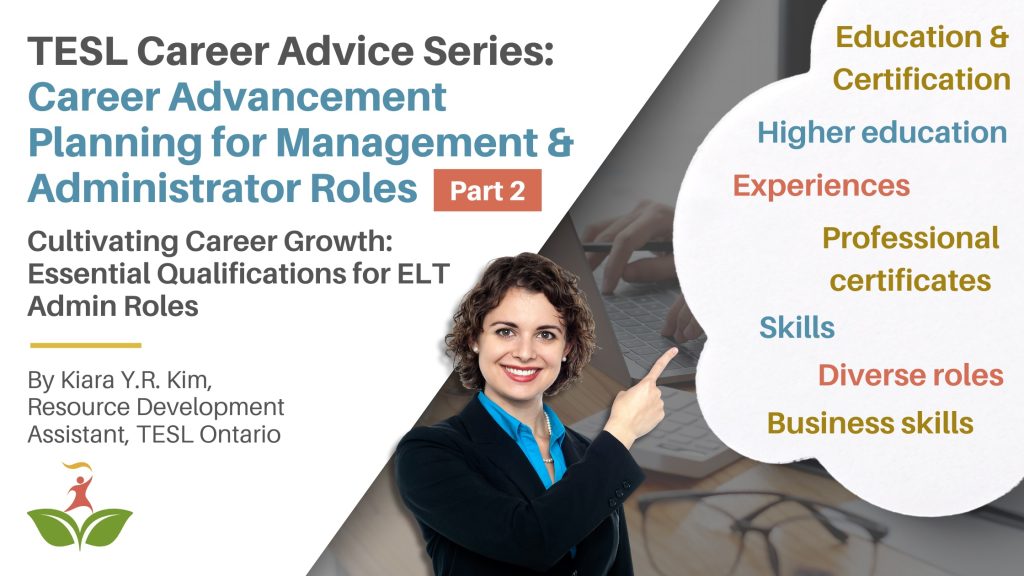Administrative roles are important in the overall management, functioning, and strategic direction of educational institutions. These roles can encompass a wide range of responsibilities that may involve overseeing operations, implementing policies, or managing resources to ensure the overall success of the educational programs and institutions.
Whether you are an educator seeking to broaden your impact on a larger scale, drawn to leadership and mentorship for educators, or motivated for professional growth, embarking on the path from educator to administrator is a journey that demands both ambition and strategic navigation.
In this unique blog series, we explore the pursuit of administrative roles in the field of English Language Training (ELT). TESL Ontario collaborated with six (6) hiring managers representing various sectors of the Ontario ELT landscape, who stand ready to share their experience, advice, and wisdom along this transitional journey. This second installment of the series is designed to share some essential qualifications to develop in order to stand out when seeking administrative roles.
EDUCATION & CERTIFICATION
Professional Certifications: Attaining professional certifications such as TESL Ontario’s OCELT (Ontario Certified English Language teacher) is crucial for ELT roles in Ontario as they indicate your compliance with industry standards and your ability to provide quality language education.
Higher education: Though it is not essential, pursuing post-graduate degrees related to ELT may enhance your expertise and credibility, positioning you as a knowledgeable professional in the field.
Continuous learning and diverse pathways: While additional credentials are valuable, remember that many skills can be gained through continuous learning and dedication to professional development and growth.
“First, it shows that you are interested in developing yourself, which helps you to get noticed by an employer. Taking a leadership role in a PD organization like TESL Ontario also gives you space to learn and practice leadership skills that can be useful later as well.” Department Chair
“I know many in management pursue additional credentials but depending on your aptitude and ability to learn, many of these things can be learned on the job, if there is a will.” Manager, Continuing & Community Education.
EXPERIENCES
Diverse Roles: There is no one pathway into administrative roles. Embrace and excel in a variety of roles throughout your career trajectory. This diversity contributes significantly to your personal and professional growth.
“I accepted a variety of roles throughout my career. The experience all culminated to my present role.” Associate Chair
“My previous role, as it was multi-faceted: I experienced growth and development on the teaching/training/curriculum side of things, but also in the organization/management/fulfilling various roles at once. “ ESL-LINC Coordinator
Teaching or Training Experience: Teaching experience is the foundation of your journey from educator to administrator as it provides you with insights into program types, learner demographics, and the general challenges and dynamics of the ELT field.
Leadership Experience: Taking on opportunities to lead whether that is formally or informally, is a pivotal part of your transition from educator to administrator. This includes experiences leading teams, managing projects, strategic planning, and contributing to professional growth in yourself and others.
SKILLS
Business Skills: Acquire financial acumen, learn financial management, bookkeeping, hone your proposal writing abilities, excel in public speaking, and master customer service and negotiation skills.
“The other experience I had working outside of the teaching profession taught me many business skills that helped me be successful in management roles.” Manager, Continuing & Community Education
Managerial Skills: Familiarize yourself with HR policies, labour laws, and strategic planning.
Curriculum Development: Proficiency in curriculum development is a specific skill highly sought after in the ELT realm.
Technical Skills: Proficiency in software tools such as email, MS Word, and Excel is essential, as well as digital literacy skills to adapt to evolving technologies.
Language Proficiency: Knowledge of multiple languages and teaching experience overseas can set you apart in the ELT field.
Cultivating these essential qualities for administrative roles in the ELT industry is a journey that combines education and certification, experience, and skill development. By developing these qualities, you can position yourself for success in the field of ELT administration.
Visit the TESL Career Centre for essential resources designed to help you navigate the English language education employment landscape.
The Career Connections: 2023 Career Fair, and Career Booster forum took place as part of the 2023 TESL Ontario Annual Virtual Conference was held on November 9th. While you may have missed it this year, please consider joining us next year for our TESL Ontario Annual Conference and Career Fair.
Kiara Kim is the Resource Development Assistant at TESL Ontario for summer 2023. She is a recent graduate from the University of Toronto, Mississauga, with an HBSc in Anthropology. Throughout her undergrad, she worked actively within university programming and various community research projects in fields of anthropology of health, historical archeology and English language education. She is looking forward to furthering her intersecting interests in research and education.

